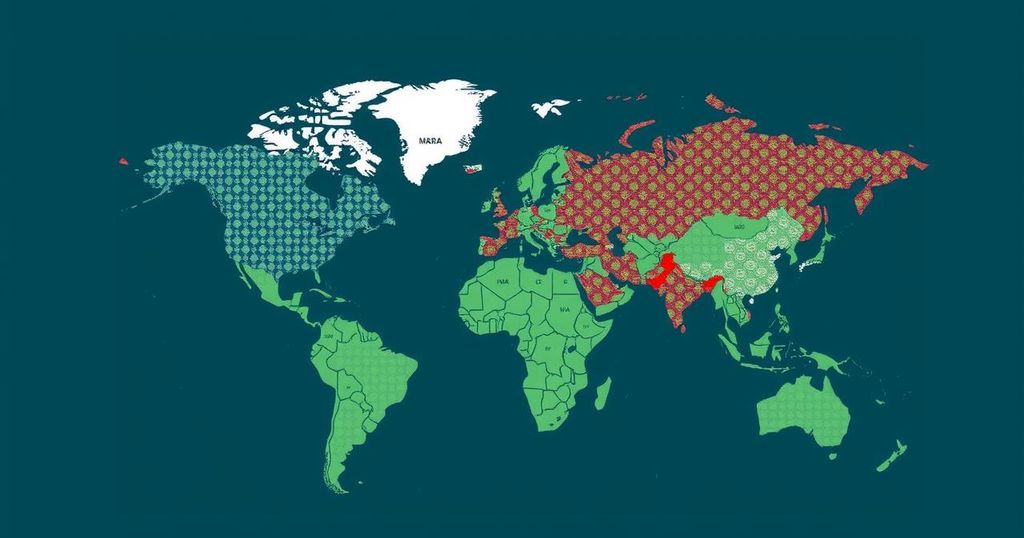Global Elections Signal Diminishing Commitment to Climate Action
The year 2024 is marked by significant elections worldwide, revealing a concerning trend of eroding commitment to climate action. Despite worsening climate conditions, right-wing political victories emphasize skepticism towards climate initiatives. As worries mount about missed climate targets, scientists and activists alike are alarmed at the lack of genuine progress in tackling the growing crisis, even as renewable energy growth continues in some regions.
The year 2024, heralded as the most significant election year globally by the United Nations, highlights a concerning trend in which countries exhibit diminished dedication to addressing the climate crisis. Despite a backdrop of escalating climate disasters and record-breaking temperatures, election outcomes in various nations have indicated a retreat from previous commitments to climate action. Notably, Donald Trump has emerged victorious in the U.S. presidential election, dismissing the climate emergency as a “big hoax.” Additionally, right-wing parties advocating skepticism towards climate action have gained momentum in European elections, while longstanding leaders like Vladimir Putin continue to prioritize fossil fuel exports amid sanctions.
Catherine Fieschi, an expert in European politics, articulates a clear observation: “It’s quite clear that in most advanced economies the big loser of the elections has been climate.” She notes that, paradoxically, significant climate events have occurred more frequently, yet public willingness to prioritize climate action has declined. After a peak in climate discourse five years ago, the conversation has shifted towards cleanliness rather than sustainability, influenced by complications such as inflation and geopolitical unrest.
Despite predictions of 2024 being the hottest year on record, climate remains largely overlooked during electoral contests, except in select cases such as India, where agricultural protests impacted the political landscape. Meanwhile, right-wing parties in Europe that criticize the fiscal burdens of climate initiatives have enjoyed electoral success. In the United Kingdom, however, the Labour party’s commitment to clean energy led to a decisive victory over the Conservatives, countering the prevailing trend.
This dynamic presents a dichotomy; while there are signs of declining momentum globally, scientists voice serious concerns regarding climate goals being missed amidst rising emissions. Political scientist Jan-Werner Müller underscores the danger of mainstream parties conceding ground to populism, stating, “If you repeat the talking points and framing of the hard right you are just making them more powerful.”
An imperative climate summit in Azerbaijan, attended by significantly fewer world leaders, encapsulates the year’s troubled climate discussions. The summit echoed a persistent theme of escalating defiance from leaders in fossil-fuel-dependent nations. Activists expressed dismay at the lack of commitment to emission reductions or climate financing for developing countries, with Gerry Arances lamenting that the influence of leaders like Trump hampers global climate action.
Amid mixed signals about renewable energy growth, the ongoing inaction and the prospect of a Trump presidency hinder prospects for meaningful climate progress. Müller cautions against the potential consequences of allowing complacency to persist, noting, “We are running out of precious time. Every day lost matters now.”
As 2024 unfolds, it presents an unprecedented number of elections globally, significantly impacting the commitment to the climate crisis. Despite the urgency exacerbated by frequent climate disasters and soaring temperatures, many nations appear to be retreating from previous climate pledges. The United Nations has dubbed 2024 as an essential year, with close to half of the world’s population approaching the polls. The elections have generally been unfavorable for climate initiatives, influenced by factors such as global inflation, conflicts, and the rise of populist political figures. Understanding this trend requires recognizing the broader context of climate discourse, public sentiment, and the political landscape that have evolved in recent years.
In summary, the pivotal election year of 2024 has revealed a troubling trend of diminishing global commitment to combat the climate crisis. As significant political victories among climate skeptics and populist leaders signal a retreat from previous climate action agendas, the interplay between climate events and public perception remains paradoxical. While certain nations demonstrate progress, the overall momentum to address climate challenges appears to falter amid competing political and economic concerns, underscoring an urgent need for renewed focus and collective action to avert a worsening climate emergency.
Original Source: www.theguardian.com




Post Comment